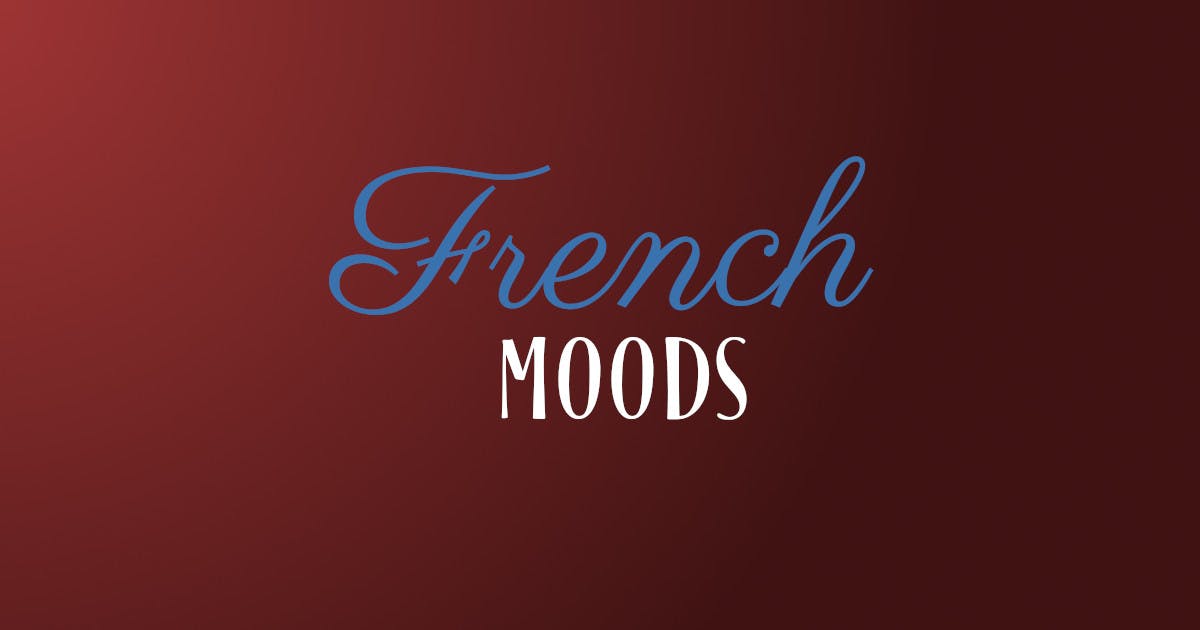Introduction To Moods In The French Language
French Moods - Indicative / Imperative / Subjonctive / Conditionnel
Mood is the grammatical category that distinguishes verb tenses. There are four moods in French: the indicative, imperative, subjunctive, and conditional. All of these moods in French, except the imperative, may be conjugated in different tenses. Each has a different function.
Indicative
The indicative mood is the most common and is used to relate facts and objective statements.
Jean-Paul se réveille tôt le matin/Jean-Paul gets up early in the morning. (present tense of the indicative mood)
Imperative
The imperative expresses the following:
Orders, requests, demands, invitations, prayers, wishes, permissions, or interdictions.
(Mange ta soupe!/Eat your soup!)
Only use the imperative with the second person of the singular, and the first and second persons of the plural.
Subjunctive
Unlike the indicative which deals with real facts, actions, or intentions, the subjunctive deals with facts, intentions, processes, or actions that are thought about/reflected upon. The actions/processes/facts/intentions are the subject of opinions or mental processes, and the mental process frame is denoted by the subjunctive.
Rule of thumb:
The subjunctive is a very difficult tense to master for English speakers. Generally, it always follows “que” (though “que” does not always indicate the subjunctive) and can be found in the following contexts:
obligation/necessity (following “il faut que”. Il faut que tu manges tes choux/You must eat your cabbages)
doubt/uncertainty (Je ne pense pas qu'il puisse y arriver/I don't think he can do it)
feelings (J'aime que tu m'appelles/I love that you call me)
will/desire/wish (J'apprécierai que vous arriviez à l'heure/I would appreciate that you arrive on time)
The following locutions usually indicate that use of the subjunctive is warranted:
afin que (in order that/so that): Il lui a envoyé un manteau afin qu'il n'ait pas froid/ He sent him a coat so that he wouldn't be cold
de sorte que (in order that): Je caresse mon chien de sorte qu'il se sente aimé / I pet my dog in order that he feels loved
pour que (in order that): La police lance un dernier appel pour que les otages soient relâchés sans violence / The police make one last appeal in order that the hostages be released without violence
bien que (although): Bien qu'il soit parti à l'heure, il est arrivé en retard / Although he left on time, he arrived late
pour autant que (inasmuch as): Pour autant qu'il soit nécessaire, l'autorité compétente pourra prendre les mesures appropriées / Inasmuch as it is necessary, the competent authority will take the appropriate measures
sans que (without + gerund): Je le regarde sans qu'il me voit / I look at him without him seeing me
quoi que (whatever): Je t'aimerai toujours quoi qu'il arrive / I will always love you whatever happens
pourvu que (provided that): Chacun est libre de penser comme il lui plaît pourvu qu'il ne trouble pas la paix / Everyone is free to think as he wishes provided that he does not disturb the public peace
assez… pour que (enough…so that): Il avait accumulé assez d'argent pour qu'il puisse s'acheter un appartement / He had accumulated enough money so that he could afford to buy an apartment
trop.. pour que (too much/many/great/far/etc…so that): Nous avions marché trop loin pour qu'il puisse nous rattraper avant la tombée de la nuit / We had walked too far so that he could not catch up with us before nightfall
Present
Expresses that the fact/process/action/intention is being conceptualized and has not been realized yet (il faut que tu manges/you must eat)
Imparfait
Only used with literary or formal speech, when the principal clause is in the past and the subjunctive clause occurs at the same time or later (but still in the past) (il fallait qu'il mangeasse son dîner/he had to eat his dinner)
Passé
Used when the subjunctive clause occurs before the principal (il faut que tu aies fini tes devoirs avant que ta mère ne revienne/you must have finished your homework before your mother returns)
Plus que Parfait
Only used with literary or formal speech, when the principal clause is in the past and the subjunctive clause occurs before the principal (Je ne croyais pas que tu eusses pû finir à temps/I did not believe you could have finished in time)
Conditionnel
Présent du Conditionnel
The conditional is used to express the fact that the action/fact/process is subject to conditions, or that the statement introduced in the sentence is subject to doubt. More specifically, it expresses:
- a conditional fact. (Si je savais jouer du piano, je pourrais donner un concert. / If I knew how to play the piano, I could give a concert.)
- expression of imaginary facts (Sur mon île, je serais Président et je ferais les loi. / On my island, I would be president and I would make the laws.)
- extreme politeness (Pourriez-vous m'ouvrir la porte?/ Could you please open the door for me?)
- hypothesis. Expresses that the sentence statement/opinion is not originating from the speaker (Selon le maire, il faudrait engager plus de policiers. / According to the mayor, more police officers should be hired.)
- indirect speech in a future time frame (Michel m'a dit qu'il renverrait la lettre dès qu'il lui aura parlé. / Michel told me that he would send the letter as soon as he will have spoken with him.)
Conditionnel Passé
Expresses:
- a hypothesis about an event in a past time frame (Elle aurait conduit sa voiture dans le fossé. / She may have driven her car into a ditch.)
- regrets/remorse about failed expectations (J'aurais dû avouer mes pêchés plus vite. / I should have confessed my sins sooner.)
- an earlier time frame compared to a conditional action in the present ( Il a décidé qu'il prendrait sa retraite une fois qu'il aurait fini d'écrire son livre. / He has decided that he would retire once he has finished writing his book.)

SUBSCRIBE: